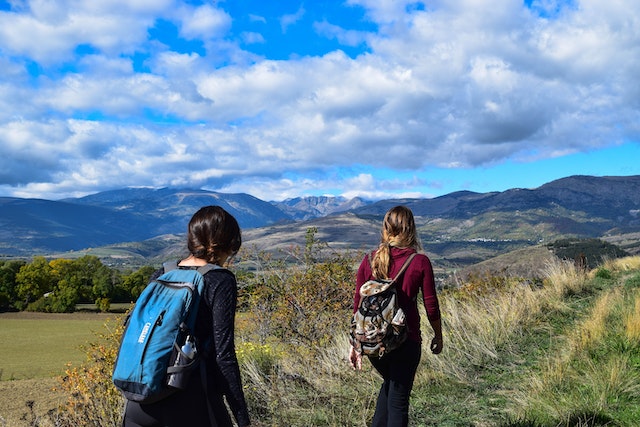Think of how most people live their lives in modern times. It’s an age of 24/7/365 online activity, work, downloading, uploading, sending, receiving. We are constantly bombarded with information from screens – our phones, the TV, tablets, laptops, heck… now even our watches.

The pressure this puts on us can sometimes go unnoticed, after all this way of being is considered ‘normal’. Yet, now more people are suffering with stress, depressive and anxiety related mental conditions than ever before. We are all influenced by our environment, though we are not aware of it.
Sometimes, we need to stop and take a breath.
The Healing Power of Nature in Relieving Stress and Restoring Balance
Being in nature evokes a sense of serenity within us. The sights, sounds, and smells of the natural world help to quiet the mind and reduce feelings of anxiety. The peacefulness of green spaces, the soothing sound of flowing water, and the gentle touch of a breeze all combine to create a calming effect on our senses. Nature’s beauty acts as a balm, easing tension and promoting relaxation.

Engaging with nature allows us to shift our focus away from the stressors of daily life. When we spend time in natural environments, we give our minds the opportunity to rest and recharge. Nature captures our attention and stimulates our senses, redirecting our thoughts from worries and concerns. This mental respite helps restore cognitive function, improve focus, and enhance overall mental well-being.
Being in a natural habitat like a woodland, beach or even just walking in the countryside relieves stress and rejuvenates the mind. Studies show that it improves well-being by reducing blood pressure, tension and decreasing the production of stress hormones. There is a huge collection of statistics and studies about how people can differ in mood, creativity, health and well-being in an article you can read here.
Why is Being in Nature so Effective for Mental Health?
Humans have an innate connection to nature, rooted in our evolutionary history. Spending time in nature allows us to reconnect with this primal connection, nurturing our sense of belonging and tranquility. We feel a sense of awe and wonder when immersed in natural beauty, which promotes positive emotions and reduce stress levels.
Simply observing the intricacies of plants, animals, or the vastness of the sky can help shift our perspective and elevate our mood.

If you view human existence on a scale, you’d see that the majority of it has been spent living alongside natural processes and rhythms. Around a hundred thousand years ago, we evolved into modern humans that depended on nature to provide us with food, water and shelter. It was our connection with nature that ensured our survival.
Today, our DNA has barely changed since then, but the world we live in has changed dramatically. Just a few generations ago saw the industrial revolution, where factory work overtook agriculture.
Now, we’re in the Information Age, which sees most of us plugged in and even further from the natural world. In some ways it is easier – we don’t need to hunt and gather to feed ourselves, but instead of chasing our dinner, we chase money.
The human mind evolved using nature. It’s obvious that being deprived of it will have a negative effect.
Make it easy to get yourself out the door! Keep you walking gear in one place so it’s easy to put on and go.

Start Now!
Sometimes we make excuses and put up mental barriers when we know we should make the effort to go outside.
‘I have too much work / cleaning / cooking etc. to do’ or ‘it’s raining today,’ and ’I don’t want to get mucky’.
But just see it for what it is, a mental barrier. Push through it.
If you are feeling the stress of a life in front of a screen, take our seven day Nature Boost Challenge and see the difference it makes to your mood, your sense of well-being, and the beneficial effects it will have on your productivity elsewhere.
The Nature Boost Challenge
Engaging in physical activities in natural settings further amplifies the stress-relieving benefits. Exercise releases endorphins, the body’s natural “feel-good” hormones, which can elevate mood and counteract stress. Whether it’s a peaceful walk in a forest, going for a hike in the mountains, or practicing yoga on a beach, combining physical activity with nature amplifies the positive impact on our mental state.
Try to complete all of these tasks in one week to start feeling the benefits of nature. Think about how you feel right now, and how you feel after the week’s challenge.
Task 1 – Whether you work in an office, or from home, you will have a tea break now and then. Each time you stop work, or when you take a break from your computer, spend it outside. Just five minutes, three times a day during your working day equals over an hour’s worth of natural daylight and fresh air added over a five day work week.
Task 2 – Make time at the weekend, or when you are not at work, to walk somewhere beautiful. It could be a leafy urban park, a footpath through fields, a stroll through the woods or a visit to your local country park. When you are outside, use all your senses to experience it fully. Touch the bark of trees, enjoy the scent of autumn, notice the colours and listen to the sounds of birds, the wind or water.
Task 3 – Get the family involved in keeping a nature diary. This could be as simple as spending a few minutes in your back garden every day, and writing down what wildlife you see. If you have kids, this is a fun exercise to encourage them to look at the nature around them.
Task 4 – Find a buddy to spend time outdoors with, and choose an activity to commit to. It can be hard to motivate yourself if you’re doing it alone, so find a friend who will do something with you. It could be a 20 minute walk during your lunch break, a bike ride after work, or a power walk with pushchairs. You are more likely to go outside if you have a friend to go with, and you can motivate one another.
Task 5 – Take your shoes off. Yes, you heard it right! Take your shoes off and walk in the grass, the sand or even the mud. Why? I hear you ask. Well, over time, our bodies accumulate a positive electric charge. Literally connecting with the Earth dissipates it, and in turn we take on a beneficial negative charge from the ground through our feet.
Wearing shoes keeps us insulated from the Earth, so we rarely have a change to neutralise this accumulated electric charge. Feeling the Earth with bare feet is a process called grounding, a subject of much study. Google it!
This might not be something you want to do when there’s snow on the ground, but most times of the year it is easily doable. Feel silly? Just walk around your garden!
Okay, so that is the Nature Boost Challenge! Unplugging ourselves is important. Spending time outdoors, in a natural environment allows us to replenish something that simply cannot be found anywhere else. Let us know how you get on!
Want to add something to this article? Please comment! Or, take the Nature Boost Challenge and report back how it changed your mood and outlook below!

